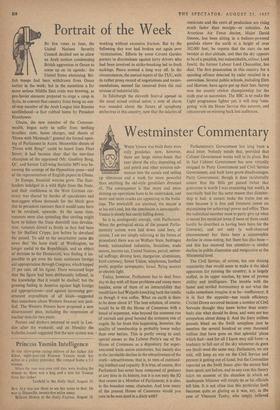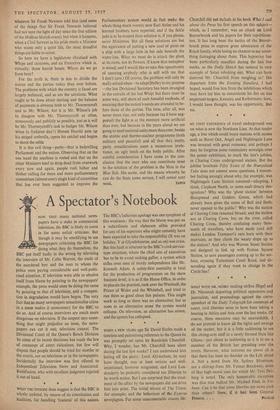Westminster Commentary
So it is, analogously enough, with. Parliament. When the geological strata of the present Parlia- mentary system were laid down (and here, of course, I am not simply referring to the forms of procedure) there was no Welfare State, hydrogen bomb, nationalised industries, Socialism, trade unions, income tax, United Nations, petrol, univer- sal suffrage, divorce laws, margarine, aluminium, hard currency, Soviet Union, telephones, football pools, popular newspapers, Israel, flying saucers or electric light.
Today, however, Parliament has to deal from day to day with all these problems and many more besides, some of them of an intractability that would have had Walpole knocking back the ratafia as though it was coffee. What on earth is there to be done about it? The best solution, of course, would be to fill the House of Commons with a breed of supermen, wise beyond the common run of mortals and good beyond the common run of angels. So far from this happening, however, the quality of membership is probably lower today than ever before. This is partly owing to such special causes as the Labour Party's use of the House of Commons as a depository for super- annuated trade union secretaries, but mainly due to the inevitable decline in the attractiveness of the work—attractiveness, that is, to men of outstand- ing intellect and capacity. It is true, of course, that Parliament has never been composed of geniuses at any time in its history, but it is not only the IQ that counts in a Member of Parliament; it is also, in the broadest sense, character. And how many of the present House of Commons would you care to be seen dead in a ditch with? Parliamentary Government has long been a dead letter. Nobody minds that, provided that Cabinet Government works well in its place. But in fact Cabinet Government has now virtually resigned to Party Government and Civil Service Government, and both have grave disadvantages. Party Government, though it does incidentally ensure that the Bills get passed (what that guarantee is worth I was examining last week), is essentially bad for the same reason that dictator- ship is bad; it cannot make the trains run on time because it is first and foremost intent on maintaining (or achieving) power and vtlice. Thus the individual member must to party give up what is meant for mankind (even if most of them could hardly be described as having been born for the Universe), and not only (a well-observed phenomenon) has there been a catastrophic decline in cross-voting, but there has also been— and this has received less attention—a similar decline in public dissension and resignation at the M inisterial level.
The Civil Service, of course, has one shining superiority that would seem to make it the ideal apparatus for running the country; it is largely staffed, in its upper reaches, by "men of proven ability and intelligence. The trouble with the hated and reviled bureaucracy is not what the radio comedians imagine it to be—inefficiency; it is in fact the opposite—too much efficiency. Crichel Down occurred because a number of Civil Servants thought they knew better than every- body else what should be done, and were not too scrupulous about doing it. And the forty million pounds blued on the Swift aeroplane (not to mention the several hundred or even thousand million that have gone on that splendid 'plane which had—and for all I know may still have—a tendency to fall out of the sky whenever its guns are fired) went the same way. Parliament, we are told, will keep an eye on the Civil Service and prevent it getting out of hand; but the Committee reported on the Swift fiasco after the money had been spent, not before, and in any case this theory takes no account of the situation in which an inadequate Minister will simply do as his officials tell him. It is not often that this particular fault becomes quite so glaring as it was, say, in the case of Viscount Tenby, who simply believed whatever Sir Frank Newsam told him (and some of the things that Sir Frank Newsam believed had not seen the light of day since the first edition of the MalleusMaleficarum); but when it happens, when a Civil Servant in his pride meets a Minister who wants only a quiet life, the most dreadful things are liable to occur.
So here we have a legislature chastised with Whips and caucuses, and an Executive which is, virtually, those horrid beasts. Where do we go from here?
For the truth is, there is less to divide the nation and the parties today than ever before. The problems with which the country is faced are largely technical, and so are the solutions. What ought to be done about sterling and the balance of payments is obvious both to Mr. Thorneycroft and to Mr. Wilson; but it is Mr. Wilson's job to disagree with Mr. Thorneycroft as often, strenuously and publicly as possible, just as it will be Mr. Thorneycroft's task to badger Mr. Wilson when (a frabjous day !) Honest Harold puts up his striped umbrella, opens his satchel and begins to shout the odds.
It is this evil thing—party—that is bedevilling Parliament and the nation. Observing that on the one hand the machine is rusted and that on the other Ministers tend to drop dead from overwork every now and again, people rush hither and thither calling for more and more parliamentary committees (almost every single kind of committee that has ever been suggested to improve the Parliamentary system would in fact make the whole thing much worse); now Earl Attlee and his learned brothers have reported, and if the fickle jade is to be trusted their solution is, if you please, more Ministries. But all these solutions are but the equivalent of putting a new coat of paint on a ship with a large hole in her side beneath the water-line. What we must do is attack the plant, at its roots, not its flowers. (I know that metaphor is mixed, and I would like to take this opportunity of assuring anybody who is still with me that I don't care.) Of course, the problem will only be really solved when—to adapt Shelley to my purpose —the last Divisional Secretary has been strangled in the entrails of the last Whip; but there must be some way, still short of such forceful methods, of ensuring that the nation's needs are attended to be- fore those of the parties. The time, after all, was never more ripe, not only because (as I have sug- gested) the fight is at the moment more artificial than ever, but because in the years ahead we are going to need national unity more than ever; beside the atomic and thermo-nuclear programme (both military and peaceful) and all that they imply, party considerations seem a monstrous irrele- vance, an ugly leech on the body politic. After careful consideration I have come to the con- clusion that the man who can contribute most to the solution of the problem is the Man in the Blue Suit. His name, and the means whereby he can do the State some service, I will reveal next































 Previous page
Previous page